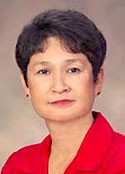President Bush appointed a UA associate professor last week to be a part of the U.S.-Mexico Border Health Commission.
Cecilia Rosales, an associate professor at the College of Public Health, joined the U.S.-Mexico Border Health Commission last week but will still work at the UA.
“”I was very honored and appreciative of the fact that I was considered to represent the state of Arizona,”” Rosales said.
The U.S.-Mexico Border Health Commission’s purpose is to alleviate issues that affect the border residents in order to assure their quality of life, she said.
Prior to working for the UA, Rosales was the Border Health Office director, and she has more than 15 years of experience in public health and cross-border issues.
Rosales said she was nominated last summer by Gov. Janet Napolitano and underwent a series of background checks before Bush appointed her on Feb. 23. She said she still has to get inducted to the commission by the Secretary of Health.
Rosales said the commission is composed of two divisions, one on the Mexican side of the border and one on the U.S. side, with a total of 26 members. Only border states are a part of the commission.
The sections meet independently all year long except for once or twice a year when they have joint meetings. Their
findings and suggestions are delegated to the Secretary of Health in an annual report. The secretary then shares it with his cabinet and the appropriate leaders, she said.
Rosales said the border is technically the 2,000-mile area of the four border states but that it also encompasses the area 100 kilometers north and south of the border. She said that is the equivalent of 44 counties on the U.S. side of the border.
Rosales said the commission deals mostly with the public health issues of this area. She said one of its main areas of focus is the lack of health insurance.
According to statistics cited by Rosales, from 2000 to 2003, Hispanic adults in the U.S. were twice as likely not to have health insurance than non-Hispanics. The frequency of Hispanics with health insurance in the U.S.-Mexico border counties is about three times lower than the rest of the country, she said.
Rosales said she would probably have to attend the commission meetings in El Paso, Texas, once or twice a month, while she continues to work at the UA.
Rosales said she hoped to represent not only border residents in Arizona, but also those paralleling the state in Mexico. She said it was really about representing the region.
Jill de Zapien, associate dean of community programs for public health administration, said Rosales’ appointment reflected positively on the university.
“”It’s a great honor for the
university,”” she said. “”It recognizes the role that faculty can play in improving the health of the (people) of the border,”” she said.
Marie Swanson, dean of the College of Public Health, said Cecilia Rosales is an expert in border health issues and that she is qualified for the job.
Swanson said Rosales has been a great addition to the College of Public Health since last fall because she is very knowledgeable in one of the most important areas of the college.
“”This is extremely important to the university because it shows that one of our faculty is one of the nation’s top experts,”” Swanson said.









